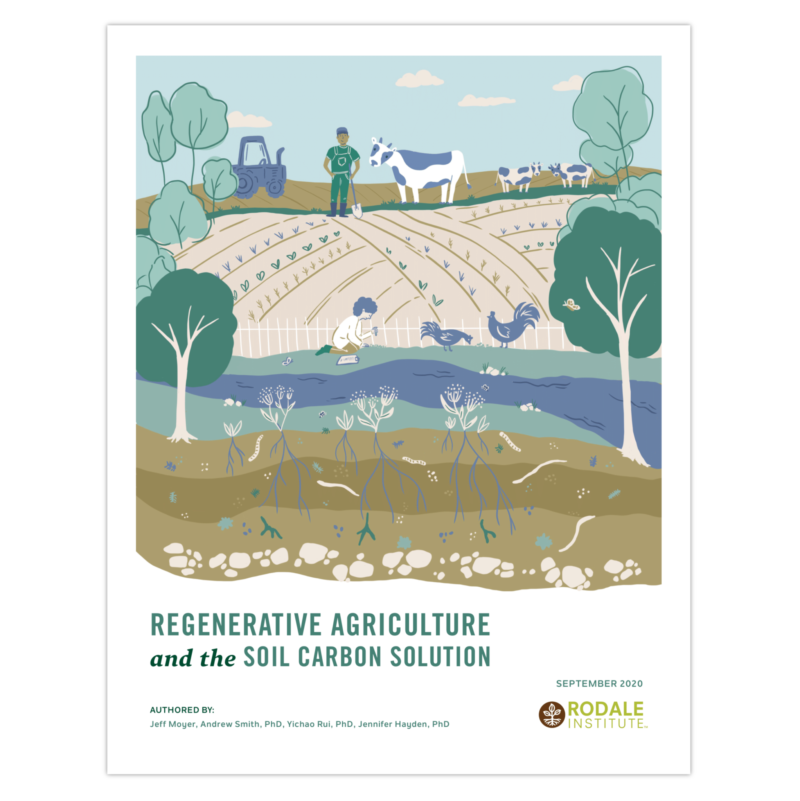New white paper shows shift to regenerative ag could sequester 100% of annual carbon emissions

Published: October 7, 2020
Category: Regenerative Agriculture, The Organic & Non-GMO Report Newsletter
Compiling the latest research on soil carbon sequestration potential, Rodale Institute makes the case for regenerative agriculture as a tool to combat the climate crisis.
As extreme weather events, rising temperatures, and global health crises continue to threaten our world, the repercussions of a changing climate are being felt more acutely than ever. As the global community looks for solutions, we must critically examine the way we grow our food, and the potential of the soil under our feet to remove carbon, a powerful greenhouse gas, from the atmosphere and lock it underground.
A new white paper released in September by Rodale Institute, the global leader in regenerative organic agriculture, has analyzed the explosive amount of new data on soil carbon sequestration potential in the past decade to conclude that a global switch to regenerative crop and pasture systems could drawdown more than 100 percent of annual CO2 emissions.
The white paper, titled “Regenerative Agriculture and the Soil Carbon Solution,” builds upon claims first made by Rodale Institute in the widely read 2014 white paper, “Regenerative Organic Agriculture and Climate Change: A Down-to-Earth Solution to Global Warming,” integrating the newest research data while providing actionable steps for consumers, policymakers, farmers, and more. The full paper, as well as a fact sheet and action toolkit, can be downloaded at RodaleInstitute.org/Climate2020. The action toolkit includes a guide to buying regenerative products, tools to support regenerative farming policy, and social media graphics.
The new publication shows that a global switch to a regenerative food system could not only feed the world while reducing chemical exposure and improving biodiversity and soil health, but could also be the key to mitigating the climate crisis. The paper was compiled through extensive peer-reviewed research data and interviews with leaders in the fields of soil microbiology, ranchland ecology, agronomy, and more, as well as research conducted in Rodale Institute’s world-renowned long-term comparison trials, including the 40-year-old Farming Systems Trial.
“Rodale Institute has been a leader in research about the impact and benefit of regenerative farming systems since Bob Rodale first started using the term in the 1980s,” said Dr. Andrew Smith, chief operating officer and chief scientist of Rodale Institute. “A vast amount of data on the carbon sequestration potential of agricultural soils has been published, including from Rodale Institute, and recent findings are starting to reinforce the benefits of regenerative agricultural practices in the fight against the climate crisis.”
“Humans broke the planet with grave agricultural malpractice,” said Tom Newmark, Chairman of The Carbon Underground, a contributor to the paper. “With this white paper, Rodale Institute shows us how regenerative agriculture has the potential to repair that damage and actually reverse some of the threatening impacts of our climate crisis. This is a compelling call to action!”
Key findings:
- Shifting both crop and pasture management globally to regenerative systems is a powerful combination that could drawdown more than 100% of annual CO2 emissions, pulling carbon from the atmosphere and storing it in the soil.
- With appropriate grazing management, livestock can increase carbon sequestered in the soil that more than offsets their greenhouse gas emissions.
- Crop yields in regenerative systems have been shown to outcompete conventional yieldsfor almost all food crops, proving that regenerative can feed the world while stabilizing the climate, regenerating ecosystems, restoring biodiversity and enhancing rural communities.
- Eaters, farmers, and policymakers can make a difference in the climate crisis fight by:
- Supporting and implementing regenerative practices
- Encouraging adoption of regenerative systems by peers and governments
- Divesting from systems that destroy soil health
Source: Rodale Institute
Download the full “Regenerative Agriculture and the Soil Carbon Solution” paper, Fact Sheet, and Action Toolkit at RodaleInstitute.org/Climate2020








